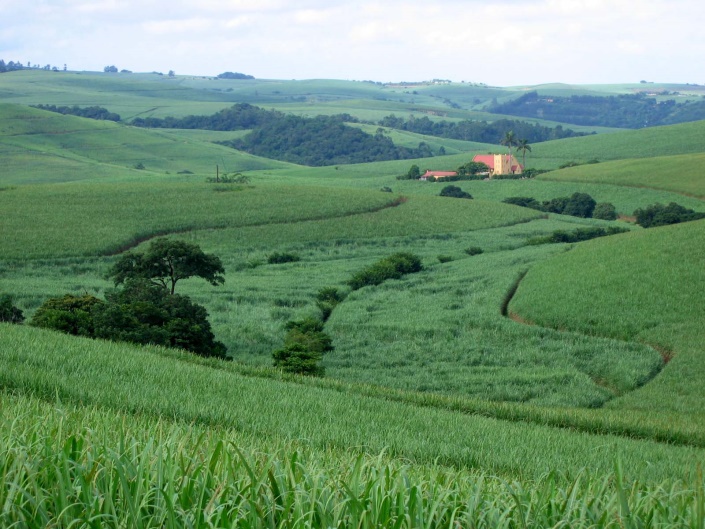
on-farm practices have a contribution to the state of natural resources.
(Photo courtesy of V. Koopman (WWF-ZA))
South Africa is currently facing a drought due to the El Niño conditions resulting in water availability challenges nationwide. KwaZulu-Natal is one of the hard hit provinces, and has since been declared (alongside Free State, Limpopo, Mpumalanga, and North West provinces) as a drought disaster area. Crop yields have been affected and revenues for cash-crop sectors like the sugar industry are bound to fall. This has a negative effect on the livelihoods of those dependent on the industry particularly in KwaZulu-Natal and Mpumalanga provinces, where sugarcane production is located, comprising nearly 50% of field crop gross farming income across the two provinces.
Sugarcane growers in the KwaZulu-Natal Midlands area which is part of the greater uMngeni River Basin predominantly practice rain-fed agriculture. This limits their options as water resource users to intervene towards water security. To understand how the sugar industry improves water security for its members and the river basin at large I embarked on research to investigate how sustainable farming practices are developed and implemented. Findings from my research showed that the sugar industry, through the local associations, provides the platform for the development of sustainable farming practices among members through local grower area associations.
It is widely accepted that members of a given community tend to follow the guidelines of the governing authority in their interactions especially if they are involved in crafting the rules and regulations. The South African sugar industry recognises the role of associations at a local scale thus at farm and mill-level there are Mill Group Boards and they play an important role in the adoption and implementation of sustainable farming practices.
An example of this important role is shown by the development, adoption, and subsequent improvements to the Sustainable Sugarcane Farm Management System (SUSFARMS®) particularly within the Noodsberg area and of the other sugarcane growing areas within the KwaZulu-Natal Midlands. In response to environmental issues and water security challenges sugarcane growers in the Noodsberg area developed SUSFARMS®. By working together in devising rules and regulations for the delivery of sugarcane to the mills, the Mill Group Boards in the areas of Dalton, Eston and Noodsberg have influenced the adoption of SUSFARMS® among sugarcane growers in their respective areas. Within Noodsberg the adoption of SUSFARMS® is virtually 100% although individual growers are at various stages of improving their compliance with the guidelines of SUSFARMS®.
The adoption and implementation of SUSFARMS® has a positive impact on on-farm interventions and practices towards water security. Such practices include compliance with legal requirements, for example the Conservation of Agricultural Resources Act, the rehabilitation of wetlands, clearance of alien invasive plants from waterways, and land-use planning. These practices improve the availability of blue and green water which is important for environmental and human needs and also supports sugarcane production. So not only do sustainable farming practices, as laid out within the SUSFARMS® guidelines, contribute to the sustainability of farm operations but they also improve the ecosystem services that the industry enjoys.
By promoting sustainable farming practices like SUSFARMS® the sugar industry through the Mill Group Boards has an opportunity to contribute towards the sustainable use of natural resources especially the scarce water resources. Other water resource users and sectors across the basin can learn from the actions of the sugar industry and also adopt sustainable farming practices and contribute towards water security.
Findings from this study contribute to the ongoing work of the recently established uMngeni School of Water Governance Research.
